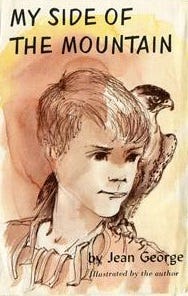Adult Encounters with Children's Stories
In My Side of the Mountain, fourteen-year-old Sam Gribley runs away to the Catskill Mountains, where he forages, traps game, and converts a hollowed-out tree into a tiny house. When his father locates him, seven months later, he’s impressed with the life Sam has built. He expresses no anger at Sam’s flight and no sadness at Sam’s absence. Returning next day to New York, he leaves Sam to continue his wilderness adventure. Six months pass before Sam sees his family again.
I first read this novel as a boy, and have read it many times since, most recently to my own kids. My first readings were all about Sam: I wondered how he would survive his first winter; I worried when, fending off a falcon’s attacks, he climbed a cliff to steal her chick. When he training that falcon to hunt, I wanted to be him. Sam befriends stranger, who dubs him “Thoreau”; and thus my first contact with Transcendentalism, and Waldenesque ideals, was through this book. My Side of the Mountain encourages this focus on Sam and on his life in the mountains: Sam narrates the story, and he does not dwell on his absent family, or on what drove him to leave home.
It was different when I read the story to my children. I thought much more about Sam's father. What was the matter with him? Even in the 1950s (the book was published in 1959), when your son ran away from home it was not considered good parenting to regard this as no big deal, to wait seven months before looking for him, or, when you did find him, to act as if everything was fine. If Sam's father gets a few stars for toleration and indulgence, and if the more extreme wing of the free-range parenting movement might approve his choices, still, I wrinkle my brow at him a little.
In this, I take myself to be going against the book’s own attitude towards Sam’s father’s actions, and inactions. The judgment “in” the book is that those are okay ways for a parent to react.
Rejecting or resisting the ideas and attitudes in a story may not be uncommon, but it does not always have the same flavor. The Lion King, that Disney renaissance Hamlet-inspired hit, is a story about betrayal, and murder, and mercy, and deserved fate...and also about a hereditary monarchy, and the preservation of that monarchy. At the beginning Mufasa is king. Next in line is Mufasa’s son Simba, and then Mufasa’s brother Scar. Scar murders Mufasa and, with Simba presumed dead, declares himself king. No animal in the prideland challenges Scar's claim—because, from the story's perspective, only a person (or animal) with greater claim to the throne can challenge Scar's rule. Elton John’s hit song for the film, “The Circle of Life” (lyrics by Tim Rice), appears a simple one about the natural cycle of birth and death, but that’s taking it too literally; really it’s a piece of political propaganda. When, in a vision, Mufasa urges Simba to take his place in the circle, he's not urging him to become dirt for the growing grass (the disingenuous speech Mufasa delivers at the film’s opening notwithstanding); no, he's urging him to challenge Scar and take his “rightful” place as king. No one I’ve watched the movie with has found this stuff even mildly upsetting. We rooted for Simba, never noticing that rooting for Simba is, in part, rooting for a dictatorship. But think about it now: yes, Scar shouldn't be king ... because nobody should be king. Really we should be rooting for a mass uprising, the rest of the prideland deposing Scar and instituting a parliamentary democracy with a scheme of proportional representation.
You can find opinions like these about the movie tucked into some reviews, and on the internet (in fact it's now on the movie's Wikipedia page). But this take on The Lion King feels more like a jokey distraction than my take on My Side of the Mountain. Why is that so? Maybe The Lion King invites us, not to believe that hereditary absolute power is okay, but just to pretend or assume so for the purposes of the story; and in an animated film for children we can separate these two acts, and engage in the second. But with My Side of the Mountain, the story is more realistic, and on the subject of paternal responsibility we are correspondingly less willing to pretend things we don’t believe.



Loved this book as a child.